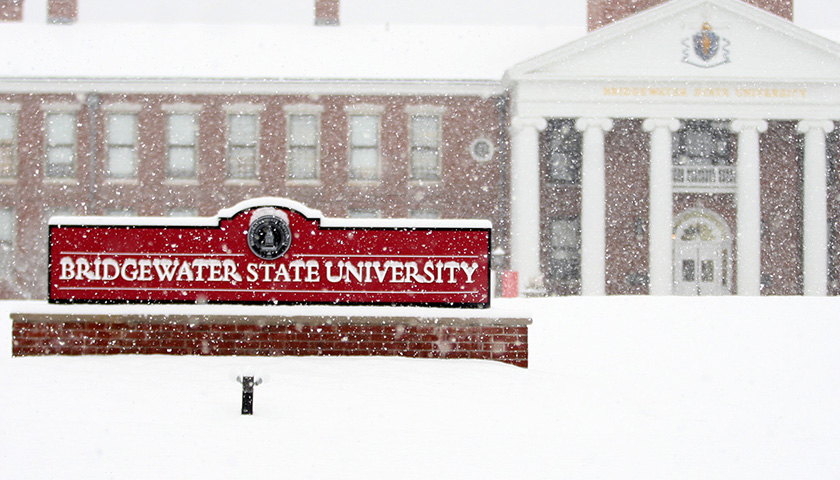A Connecticut social worker seeking a job teaching sociology at Bridgewater State University in Massachusetts has filed a lawsuit against the school claiming she was asked during the interview to defend her “white privilege.”
Donna Johnston said she was stunned in June 2021 by the interviewer’s request that she think about her “white privilege,” reported the Boston Globe, and, then, by the follow-up statement, “Black students may not be able to relate to you because of your white privilege.”
According to the report, Johnston was one of 10 applicants for a temporary, one-year position at the level of assistant professor in the university’s School of Social Work.
For her interview, Johnston told the Globe she anticipated questions about her clinical work, teaching experience at both Southern New Hampshire University and Virginia Commonwealth University, and field work, but not her “whiteness.”
She said, nevertheless, that she did acknowledge her “white privilege” to the interviewer.
Johnston added her impression that the interviewer who brought up her race during the interview, a fellow social worker, did not show her respect.
“We are supposed to respect the inherent dignity and worth of every individual we come across, and she did not show that to me on that day,” she said.
Johnston was not offered the job, and subsequently filed a race and employment discrimination lawsuit against Bridgewater State in February, claiming she was the victim of racism during the interview, and that it is her “whiteness” that cost her a job.
Johnston said she believes her qualifications surpass those of the three women hired in the university’s School of Social Work.
The school, however, said race played no factor in the decision not to hire Johnston, the Globe reported, and continued in its 29-page position statement filed with the Massachusetts Commission Against Discrimination that Johnston was lacking in expertise, active classroom experience, and also failed to show she was student-focused.
“Any possibility of discriminatory motive is contradicted by the fact that the university ultimately hired two Caucasians,” the school said in its statement, according to the Globe. The university apparently chose a black woman to fill a third position.
The school said in its statement Johnston’s interviewer, an associate professor in Bridgewater State’s School of Social Work who is no longer with the university, posed the “white privilege” question to her with the intention of providing her an “opportunity to show … how she would use her experience and teaching skills to overcome a common obstacle as a social worker and teacher.”
Johnston’s response, however, “missed the target,” the school stated.
Apparently the university did not provide any further statement, citing it “does not comment on personnel or pending legal matters.”
The lawsuit, which was filed February 24 in Plymouth Superior Court, seeks a jury trial and $50,000 in damages.
“If somebody had said to a black applicant, let’s talk about your blackness, or how does your blackness affect something, there’d be outrage,” Johnston’s lawyer Scott Lathrop said, adding the reverse discrimination lawsuit is the first one he has encountered in his decades-long career.
Cambridge employment attorney David Belfort told the Globe the fact that the university hired two other white women may help the school’s case, but also said race should not be part of the interview process.
“To ask about somebody’s whiteness, that implies that the color of their skin is the consideration, or the problem,” Belfort said. “Privilege in general might be a legitimate consideration, but white privilege? Why bring white into it? The white part is what makes it potentially illegal.”
Nationally recognized legal scholar Jonathan Turley also wrote about the case Monday, agreeing the fact that two white applicants were hired and, second, that the university is citing Johnston’s lack of classroom experience as a factor in rejecting her, create challenges for her lawsuit.
“It is clear, however, that Johnson’s race was interjected into the interview process,” Turley said. “The school is likely to argue that such questions arise with social workers and that they wanted to see how Johnston would respond.”
The question in the case, he added, and posted to Twitter, is “whether an applicant can be subject to added scrutiny because of her race.”
One expert noted that the remarks did not sound “profoundly racist.” However, the test is likely not to be whether something is profoundly or simply racist. The question is whether an applicant can be subject to added scrutiny because of her race. https://t.co/J63BhUMgwV
— Jonathan Turley (@JonathanTurley) March 14, 2022
Turley cited the Equal Employment Opportunity Commission (EEOC), which says while job applicants can be asked for their race “for affirmative action purposes and/or to track applicant flow,” otherwise, “pre-employment questions about race can suggest that race will be used as a basis for making selection decisions. If the information is used in the selection decision and members of particular racial groups are excluded from employment, the inquiries can constitute evidence of discrimination.”
EEOC also recommends against asking job applicants about personal characteristics “that are protected by law, such as race, color, religion, sex, national origin or age.”
“These types of questions may discourage some individuals from applying, may be viewed suspiciously by some applicants, and may be considered evidence of intent to discriminate by the EEOC,” the commission explains.
As for similar cases, Turley mentions that Facebook “was recently sued by black applicants who objected to being told about the desire to find applicants who are a ‘cultural fit’ with the company,” and a “white executive was also recently awarded $10 million after he successfully argued that he was fired because Novant Health wanted to achieve diversity goals.”
– – –
Susan Berry, PhD, is national education editor at The Star News Network. Email tips to [email protected].
Photo “Bridgewater State University” by Bridgewater State University.





